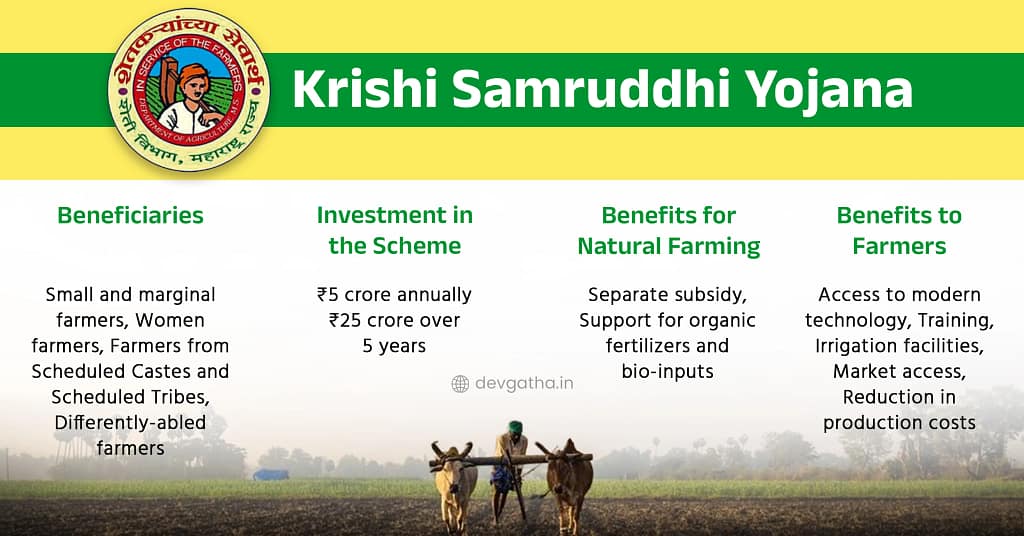While Maharashtra itself is prone to drought and flood due to unique geographical reasons, increasing global warming and consequential calamities add to the agricultural woes and misfortune of the farmers with loss of crops and livestock. While this is a major cause for the vulnerability of farmers in the state, other factors like market instability, high production cost, economic fluctuations, etc. also play their roles.
Against this backdrop, the Devendra Fadnavis government has decided to take on the root concerns for farming and farmers with some transformative steps, such as
- fast adoption of sustainable agricultural practices,
- use of technology,
- building agricultural infrastructure,
- empowering small and marginal farmers
Broadly, these steps form the framework of the ‘Krishi Samruddhi Yojana’ introduced by the Fadnavis government. This is a comprehensive scheme based on scientific study that can transform Maharashtra’s agriculture sector and provide long-term benefits to the farmers, compared with the short-term relief of loan waivers. A grant of Rs 25,000 crore has also been made available by the government for the implementation of the scheme over the next five years. This holistic scheme, aimed at increasing climate-resilient farming and farmers’ income, contains the following specific measures to address the key challenges:
- Promoting micro-irrigation and the use of climate-friendly seeds.
- Using AI, drones, robotics, and advanced analytics to address climate change, falling productivity, water scarcity, soil health, market trends, and so on.
- Improving warehousing and transportation systems at strategic points.
- Providing direct financial support to farmers for investing in sustainable farming.
- Maintaining district-wise data on crop area, account holders, and the gross direct value of the crop sector.
The Krishi Samruddhi Yojana is designed to address the major difficulties encountered by Maharashtra farmers, such as high input costs, low production, and vulnerability to disasters and pest attacks. According to Chief Minister Fadnavis, the plan aims to cut farming expenses while increasing crop yields through targeted interventions. The project is consistent with the state’s overall goal of developing a resilient agricultural environment that supports farmers’ livelihoods and provides food security. The plan aims to make farming both commercially and environmentally viable by merging technology and sustainable methods.
The Rs 1 crop insurance scheme launched during the previous coalition government has been found to be benefiting insurance companies more than farmers. This has led the current Devendra Fadnavis government to replace the scheme with a revised crop insurance scheme. This decision of the government came following a high-level meeting held on March 20, 2025, in which the Chief Minister had directed to revise the Comprehensive Crop Insurance Scheme and use the government funds saved from it to create infrastructure for agriculture and increase capital investment in agriculture.
The Krishi Samridhi Yojana was approved in the State Cabinet meeting held on 29 April 2025. On 9 May 2025, the government of Maharashtra took the decision to implement the scheme. A significant portion of the Rs 25,000 crore budget will be allocated to improving agricultural infrastructure. This includes the development of farm ponds, drip irrigation systems, and mechanization initiatives to optimize water usage and labor efficiency. Special priority will be given to benefitting small and marginal landholding farmers, women farmers, Scheduled Caste-Jamaati farmers, and disabled farmers in the state or under the scheme.
Subsidy for organic farming
The Krishi Samriddhi Yojana is not just another scheme to provide subsidies; rather, it’s a comprehensive scheme for revitalization of agriculture in the state, meeting economic, technical, and environmental aspects. The objectives of the scheme are to increase capital investment in the agricultural sector, reduce production costs, increase farm productivity, strengthen the price chain, encourage climate-friendly and sustainable farming, promote organic farming, and develop infrastructure for farming. Specifically, the state government’s decision to provide subsidies for organic farming through this scheme is unique.
For this scheme, the state government will invest a total of Rs 25,000 crore for the next five years, at the rate of Rs 5,000 crore per year. This fund will be used to invest in various areas such as water management for agriculture, micro-irrigation, soil health management, climate-friendly cropping systems, value chain development, post-harvest infrastructure development, strengthening of agriculture-related institutions, and research and demonstration.
For the effective implementation of this scheme, a special committee was formed, headed by the Chairman of the Nanaji Deshmukh Krishi Sanjeevani Project, according to a government decision on June 12, 2025. This committee was given the responsibility of preparing the working procedures and guidelines for the scheme. After the committee properly discharged its responsibility, the state government issued a government decision on July 22, 2025, mentioning the working procedures and guidelines for the implementation of the Krishi Samruddhi Yojana.
Maharashtra under the current dispensation has taken a progressive step to fortify its agriculture sector and farmers’ conditions in the face of climate change and unsustainable farming practices. Due to its structural nature, the Krushi Samuddhi Yojana, along with the Jalyukt Shivar and the river-linking project (the other two pathbreaking initiatives of the Fadnavis government) will bring a paradigm change in the farm sector in Maharashtra.


